Analysing Organisational Behaviour, Motivation at Next plc
VerifiedAdded on 2023/06/17
|15
|4322
|300
Report
AI Summary
This report provides an in-depth analysis of organisational behaviour within Next plc, a multinational British retail store. It examines how organisational culture, power dynamics, and politics influence individual and team behaviour and performance. The report explores different types of power, such as legitimate, reward, and referent power, and their impact on employees. It also discusses the negative effects of organisational politics and the importance of a positive workplace culture. Furthermore, the report evaluates content and process theories of motivation, focusing on ERG motivation theory and Vroom's expectancy theory, and their role in achieving organisational goals. Finally, it touches upon the characteristics of effective and ineffective teams and applies organisational behaviour concepts to the specific business situation of Next plc. This document is available on Desklib, a platform offering study tools and solved assignments for students.

Organisational
behaviour
behaviour
Paraphrase This Document
Need a fresh take? Get an instant paraphrase of this document with our AI Paraphraser
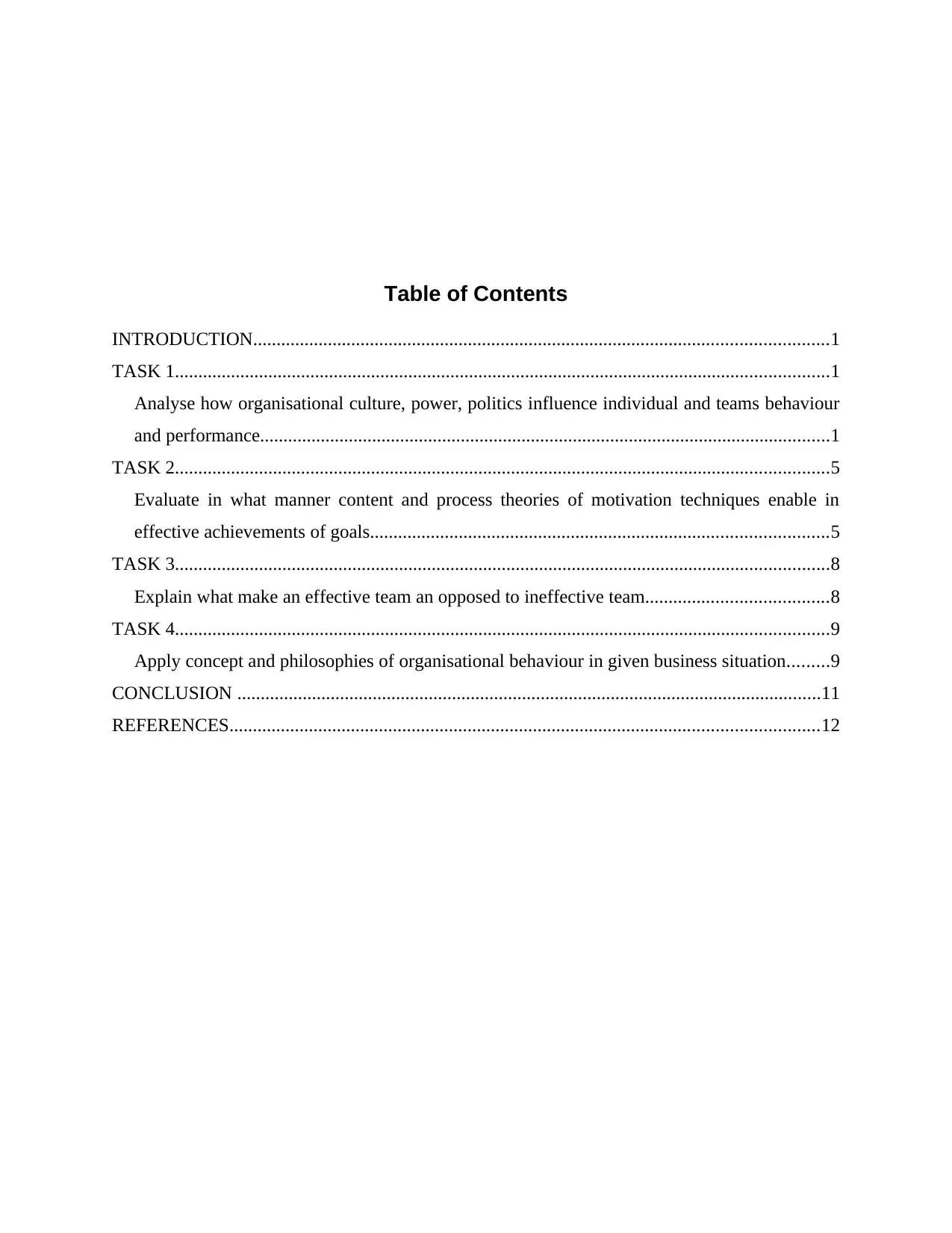
Table of Contents
INTRODUCTION...........................................................................................................................1
TASK 1............................................................................................................................................1
Analyse how organisational culture, power, politics influence individual and teams behaviour
and performance..........................................................................................................................1
TASK 2............................................................................................................................................5
Evaluate in what manner content and process theories of motivation techniques enable in
effective achievements of goals..................................................................................................5
TASK 3............................................................................................................................................8
Explain what make an effective team an opposed to ineffective team.......................................8
TASK 4............................................................................................................................................9
Apply concept and philosophies of organisational behaviour in given business situation.........9
CONCLUSION .............................................................................................................................11
REFERENCES..............................................................................................................................12
INTRODUCTION...........................................................................................................................1
TASK 1............................................................................................................................................1
Analyse how organisational culture, power, politics influence individual and teams behaviour
and performance..........................................................................................................................1
TASK 2............................................................................................................................................5
Evaluate in what manner content and process theories of motivation techniques enable in
effective achievements of goals..................................................................................................5
TASK 3............................................................................................................................................8
Explain what make an effective team an opposed to ineffective team.......................................8
TASK 4............................................................................................................................................9
Apply concept and philosophies of organisational behaviour in given business situation.........9
CONCLUSION .............................................................................................................................11
REFERENCES..............................................................................................................................12
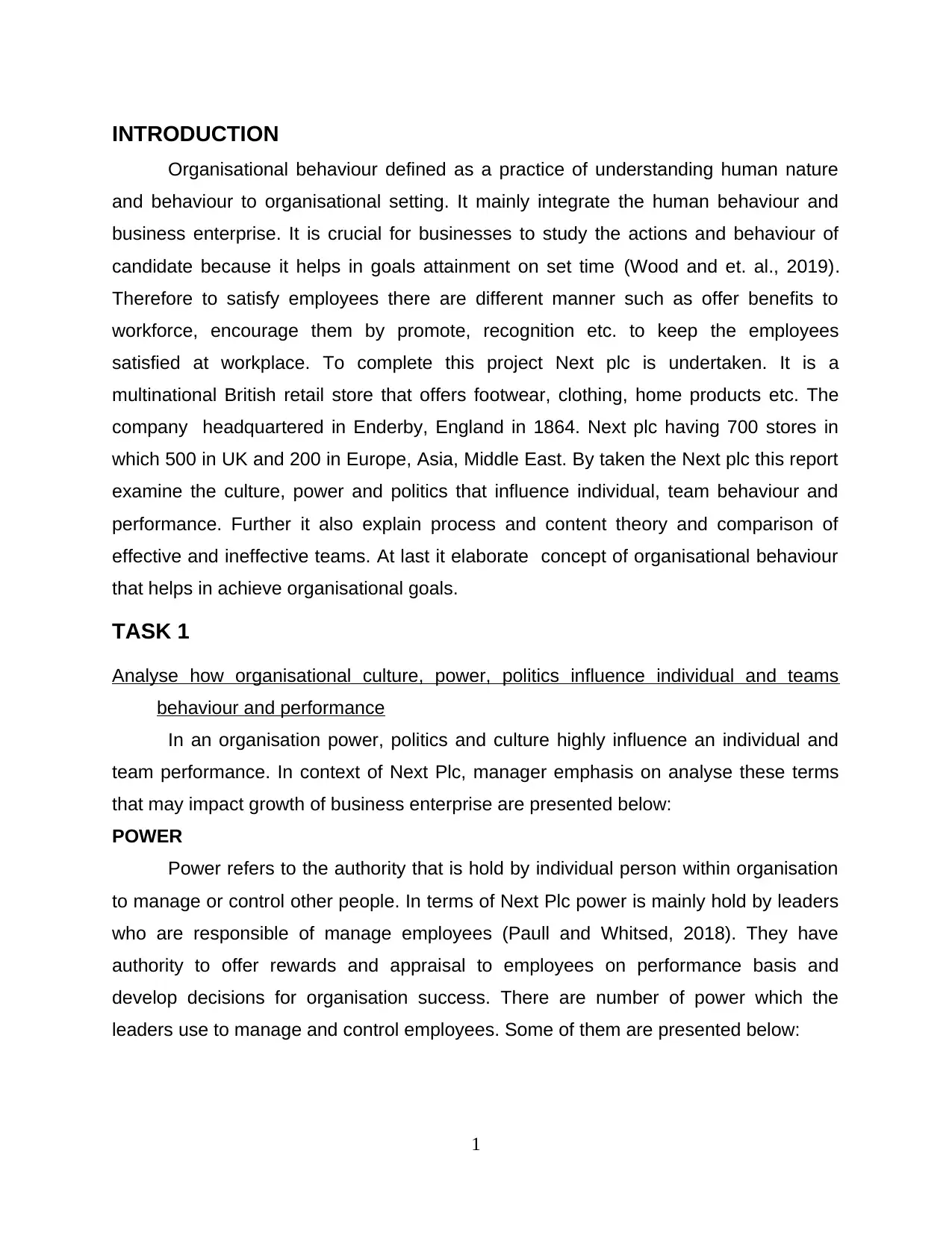
INTRODUCTION
Organisational behaviour defined as a practice of understanding human nature
and behaviour to organisational setting. It mainly integrate the human behaviour and
business enterprise. It is crucial for businesses to study the actions and behaviour of
candidate because it helps in goals attainment on set time (Wood and et. al., 2019).
Therefore to satisfy employees there are different manner such as offer benefits to
workforce, encourage them by promote, recognition etc. to keep the employees
satisfied at workplace. To complete this project Next plc is undertaken. It is a
multinational British retail store that offers footwear, clothing, home products etc. The
company headquartered in Enderby, England in 1864. Next plc having 700 stores in
which 500 in UK and 200 in Europe, Asia, Middle East. By taken the Next plc this report
examine the culture, power and politics that influence individual, team behaviour and
performance. Further it also explain process and content theory and comparison of
effective and ineffective teams. At last it elaborate concept of organisational behaviour
that helps in achieve organisational goals.
TASK 1
Analyse how organisational culture, power, politics influence individual and teams
behaviour and performance
In an organisation power, politics and culture highly influence an individual and
team performance. In context of Next Plc, manager emphasis on analyse these terms
that may impact growth of business enterprise are presented below:
POWER
Power refers to the authority that is hold by individual person within organisation
to manage or control other people. In terms of Next Plc power is mainly hold by leaders
who are responsible of manage employees (Paull and Whitsed, 2018). They have
authority to offer rewards and appraisal to employees on performance basis and
develop decisions for organisation success. There are number of power which the
leaders use to manage and control employees. Some of them are presented below:
1
Organisational behaviour defined as a practice of understanding human nature
and behaviour to organisational setting. It mainly integrate the human behaviour and
business enterprise. It is crucial for businesses to study the actions and behaviour of
candidate because it helps in goals attainment on set time (Wood and et. al., 2019).
Therefore to satisfy employees there are different manner such as offer benefits to
workforce, encourage them by promote, recognition etc. to keep the employees
satisfied at workplace. To complete this project Next plc is undertaken. It is a
multinational British retail store that offers footwear, clothing, home products etc. The
company headquartered in Enderby, England in 1864. Next plc having 700 stores in
which 500 in UK and 200 in Europe, Asia, Middle East. By taken the Next plc this report
examine the culture, power and politics that influence individual, team behaviour and
performance. Further it also explain process and content theory and comparison of
effective and ineffective teams. At last it elaborate concept of organisational behaviour
that helps in achieve organisational goals.
TASK 1
Analyse how organisational culture, power, politics influence individual and teams
behaviour and performance
In an organisation power, politics and culture highly influence an individual and
team performance. In context of Next Plc, manager emphasis on analyse these terms
that may impact growth of business enterprise are presented below:
POWER
Power refers to the authority that is hold by individual person within organisation
to manage or control other people. In terms of Next Plc power is mainly hold by leaders
who are responsible of manage employees (Paull and Whitsed, 2018). They have
authority to offer rewards and appraisal to employees on performance basis and
develop decisions for organisation success. There are number of power which the
leaders use to manage and control employees. Some of them are presented below:
1
⊘ This is a preview!⊘
Do you want full access?
Subscribe today to unlock all pages.

Trusted by 1+ million students worldwide

Legitimate power- In this power, command and control structure is followed by
leaders (Martínez-Caro, Cegarra-Navarro and Alfonso-Ruiz, 2020). In this
manager hold particular position in an organisation to manager individuals.
Reward power- As per this power, leaders and managers offers rewards and
recognition to workers for their effective work. Manager of Next plc. offer
attractive appreciation rewards for their excellent work.
Referent power- It is recognised as cult of personality. In this power, leaders
emphasis on develop strong personality and also influence workers to work
appropriately so that overall company goals are attained effectively.
Informational power- In this type of power, leader of Next plc have whole
information regarding what has to be done and how to plan to attain company
objectives in goals attainment. In this information are related to decision support
information, rival firm strategies etc.
Expert power- This type of power hold by those individual in organisation who
have in depth knowledge about any topic. So that thy helps Next plc in goal
attainment in business marketplace.
Power is crucial determinant which is used by leaders of Next plc to manage or
control work of employees so that they give efficient outcome (Oh and Han, 2020).
Hence, next plc adopts reward power in which top authority offer rewards and
appreciation to excellent performer of companies. This influence the individual
behaviour in positive manner and also develops team performance.
POLITICS
The annoyance actions are mainly performed by non effective workers of
organisation. Therefore, employees who are unfocused and ineffective towards goal
achievement create misbehaviour in company. These employees distract other towards
effective working. Organisational politics demonstrate several categories such as rocks,
weeds, woods and high grounds. Weeds represent personal influence and informal
networks. High grounds refer to integrating of authorities with business systems. Rocks
considered the dependence upon individual interaction. Woods reflects guidelines and
process that have unspoken routines, hidden activities etc. In an organisation if politics
2
leaders (Martínez-Caro, Cegarra-Navarro and Alfonso-Ruiz, 2020). In this
manager hold particular position in an organisation to manager individuals.
Reward power- As per this power, leaders and managers offers rewards and
recognition to workers for their effective work. Manager of Next plc. offer
attractive appreciation rewards for their excellent work.
Referent power- It is recognised as cult of personality. In this power, leaders
emphasis on develop strong personality and also influence workers to work
appropriately so that overall company goals are attained effectively.
Informational power- In this type of power, leader of Next plc have whole
information regarding what has to be done and how to plan to attain company
objectives in goals attainment. In this information are related to decision support
information, rival firm strategies etc.
Expert power- This type of power hold by those individual in organisation who
have in depth knowledge about any topic. So that thy helps Next plc in goal
attainment in business marketplace.
Power is crucial determinant which is used by leaders of Next plc to manage or
control work of employees so that they give efficient outcome (Oh and Han, 2020).
Hence, next plc adopts reward power in which top authority offer rewards and
appreciation to excellent performer of companies. This influence the individual
behaviour in positive manner and also develops team performance.
POLITICS
The annoyance actions are mainly performed by non effective workers of
organisation. Therefore, employees who are unfocused and ineffective towards goal
achievement create misbehaviour in company. These employees distract other towards
effective working. Organisational politics demonstrate several categories such as rocks,
weeds, woods and high grounds. Weeds represent personal influence and informal
networks. High grounds refer to integrating of authorities with business systems. Rocks
considered the dependence upon individual interaction. Woods reflects guidelines and
process that have unspoken routines, hidden activities etc. In an organisation if politics
2
Paraphrase This Document
Need a fresh take? Get an instant paraphrase of this document with our AI Paraphraser
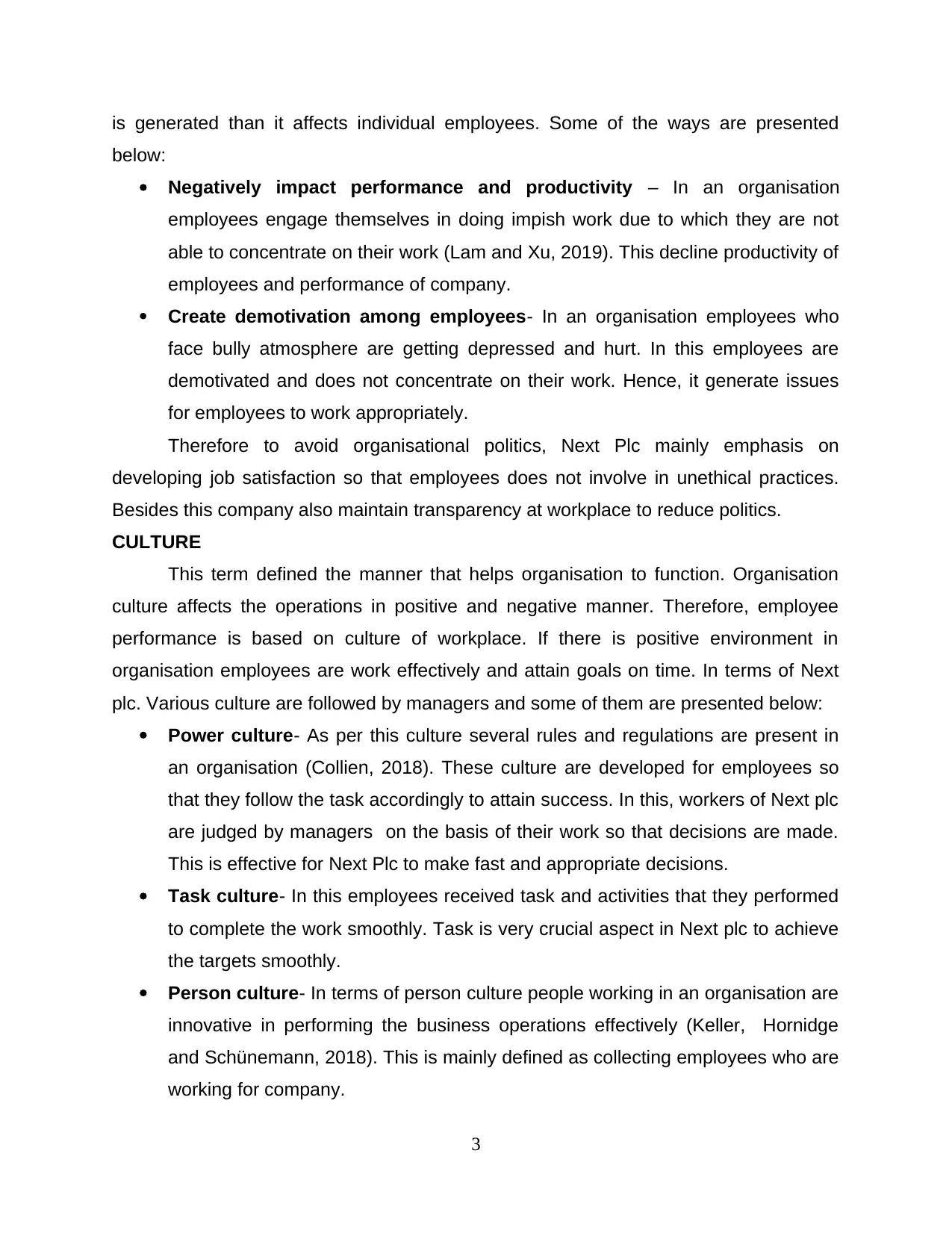
is generated than it affects individual employees. Some of the ways are presented
below:
Negatively impact performance and productivity – In an organisation
employees engage themselves in doing impish work due to which they are not
able to concentrate on their work (Lam and Xu, 2019). This decline productivity of
employees and performance of company.
Create demotivation among employees- In an organisation employees who
face bully atmosphere are getting depressed and hurt. In this employees are
demotivated and does not concentrate on their work. Hence, it generate issues
for employees to work appropriately.
Therefore to avoid organisational politics, Next Plc mainly emphasis on
developing job satisfaction so that employees does not involve in unethical practices.
Besides this company also maintain transparency at workplace to reduce politics.
CULTURE
This term defined the manner that helps organisation to function. Organisation
culture affects the operations in positive and negative manner. Therefore, employee
performance is based on culture of workplace. If there is positive environment in
organisation employees are work effectively and attain goals on time. In terms of Next
plc. Various culture are followed by managers and some of them are presented below:
Power culture- As per this culture several rules and regulations are present in
an organisation (Collien, 2018). These culture are developed for employees so
that they follow the task accordingly to attain success. In this, workers of Next plc
are judged by managers on the basis of their work so that decisions are made.
This is effective for Next Plc to make fast and appropriate decisions.
Task culture- In this employees received task and activities that they performed
to complete the work smoothly. Task is very crucial aspect in Next plc to achieve
the targets smoothly.
Person culture- In terms of person culture people working in an organisation are
innovative in performing the business operations effectively (Keller, Hornidge
and Schünemann, 2018). This is mainly defined as collecting employees who are
working for company.
3
below:
Negatively impact performance and productivity – In an organisation
employees engage themselves in doing impish work due to which they are not
able to concentrate on their work (Lam and Xu, 2019). This decline productivity of
employees and performance of company.
Create demotivation among employees- In an organisation employees who
face bully atmosphere are getting depressed and hurt. In this employees are
demotivated and does not concentrate on their work. Hence, it generate issues
for employees to work appropriately.
Therefore to avoid organisational politics, Next Plc mainly emphasis on
developing job satisfaction so that employees does not involve in unethical practices.
Besides this company also maintain transparency at workplace to reduce politics.
CULTURE
This term defined the manner that helps organisation to function. Organisation
culture affects the operations in positive and negative manner. Therefore, employee
performance is based on culture of workplace. If there is positive environment in
organisation employees are work effectively and attain goals on time. In terms of Next
plc. Various culture are followed by managers and some of them are presented below:
Power culture- As per this culture several rules and regulations are present in
an organisation (Collien, 2018). These culture are developed for employees so
that they follow the task accordingly to attain success. In this, workers of Next plc
are judged by managers on the basis of their work so that decisions are made.
This is effective for Next Plc to make fast and appropriate decisions.
Task culture- In this employees received task and activities that they performed
to complete the work smoothly. Task is very crucial aspect in Next plc to achieve
the targets smoothly.
Person culture- In terms of person culture people working in an organisation are
innovative in performing the business operations effectively (Keller, Hornidge
and Schünemann, 2018). This is mainly defined as collecting employees who are
working for company.
3
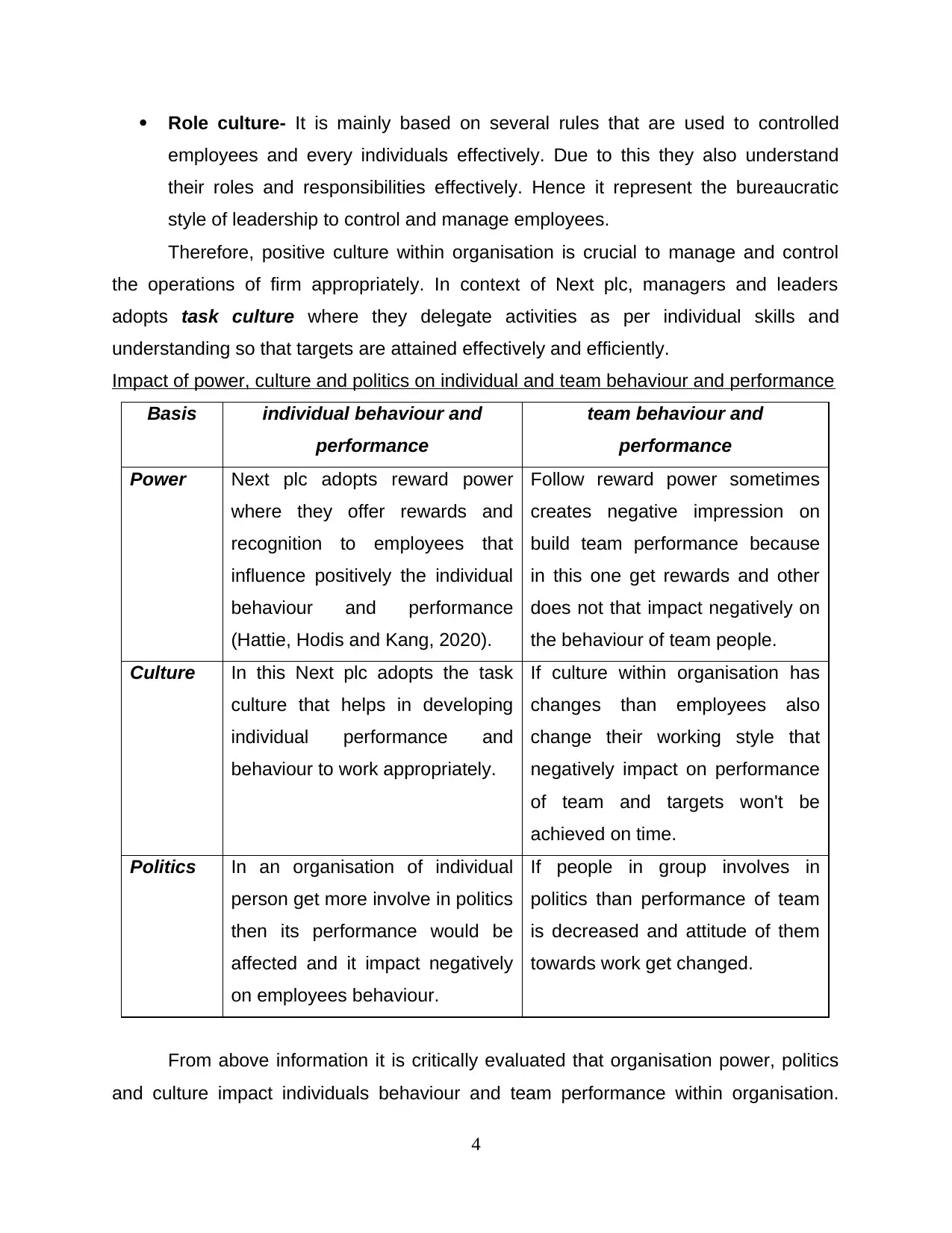
Role culture- It is mainly based on several rules that are used to controlled
employees and every individuals effectively. Due to this they also understand
their roles and responsibilities effectively. Hence it represent the bureaucratic
style of leadership to control and manage employees.
Therefore, positive culture within organisation is crucial to manage and control
the operations of firm appropriately. In context of Next plc, managers and leaders
adopts task culture where they delegate activities as per individual skills and
understanding so that targets are attained effectively and efficiently.
Impact of power, culture and politics on individual and team behaviour and performance
Basis individual behaviour and
performance
team behaviour and
performance
Power Next plc adopts reward power
where they offer rewards and
recognition to employees that
influence positively the individual
behaviour and performance
(Hattie, Hodis and Kang, 2020).
Follow reward power sometimes
creates negative impression on
build team performance because
in this one get rewards and other
does not that impact negatively on
the behaviour of team people.
Culture In this Next plc adopts the task
culture that helps in developing
individual performance and
behaviour to work appropriately.
If culture within organisation has
changes than employees also
change their working style that
negatively impact on performance
of team and targets won't be
achieved on time.
Politics In an organisation of individual
person get more involve in politics
then its performance would be
affected and it impact negatively
on employees behaviour.
If people in group involves in
politics than performance of team
is decreased and attitude of them
towards work get changed.
From above information it is critically evaluated that organisation power, politics
and culture impact individuals behaviour and team performance within organisation.
4
employees and every individuals effectively. Due to this they also understand
their roles and responsibilities effectively. Hence it represent the bureaucratic
style of leadership to control and manage employees.
Therefore, positive culture within organisation is crucial to manage and control
the operations of firm appropriately. In context of Next plc, managers and leaders
adopts task culture where they delegate activities as per individual skills and
understanding so that targets are attained effectively and efficiently.
Impact of power, culture and politics on individual and team behaviour and performance
Basis individual behaviour and
performance
team behaviour and
performance
Power Next plc adopts reward power
where they offer rewards and
recognition to employees that
influence positively the individual
behaviour and performance
(Hattie, Hodis and Kang, 2020).
Follow reward power sometimes
creates negative impression on
build team performance because
in this one get rewards and other
does not that impact negatively on
the behaviour of team people.
Culture In this Next plc adopts the task
culture that helps in developing
individual performance and
behaviour to work appropriately.
If culture within organisation has
changes than employees also
change their working style that
negatively impact on performance
of team and targets won't be
achieved on time.
Politics In an organisation of individual
person get more involve in politics
then its performance would be
affected and it impact negatively
on employees behaviour.
If people in group involves in
politics than performance of team
is decreased and attitude of them
towards work get changed.
From above information it is critically evaluated that organisation power, politics
and culture impact individuals behaviour and team performance within organisation.
4
⊘ This is a preview!⊘
Do you want full access?
Subscribe today to unlock all pages.

Trusted by 1+ million students worldwide
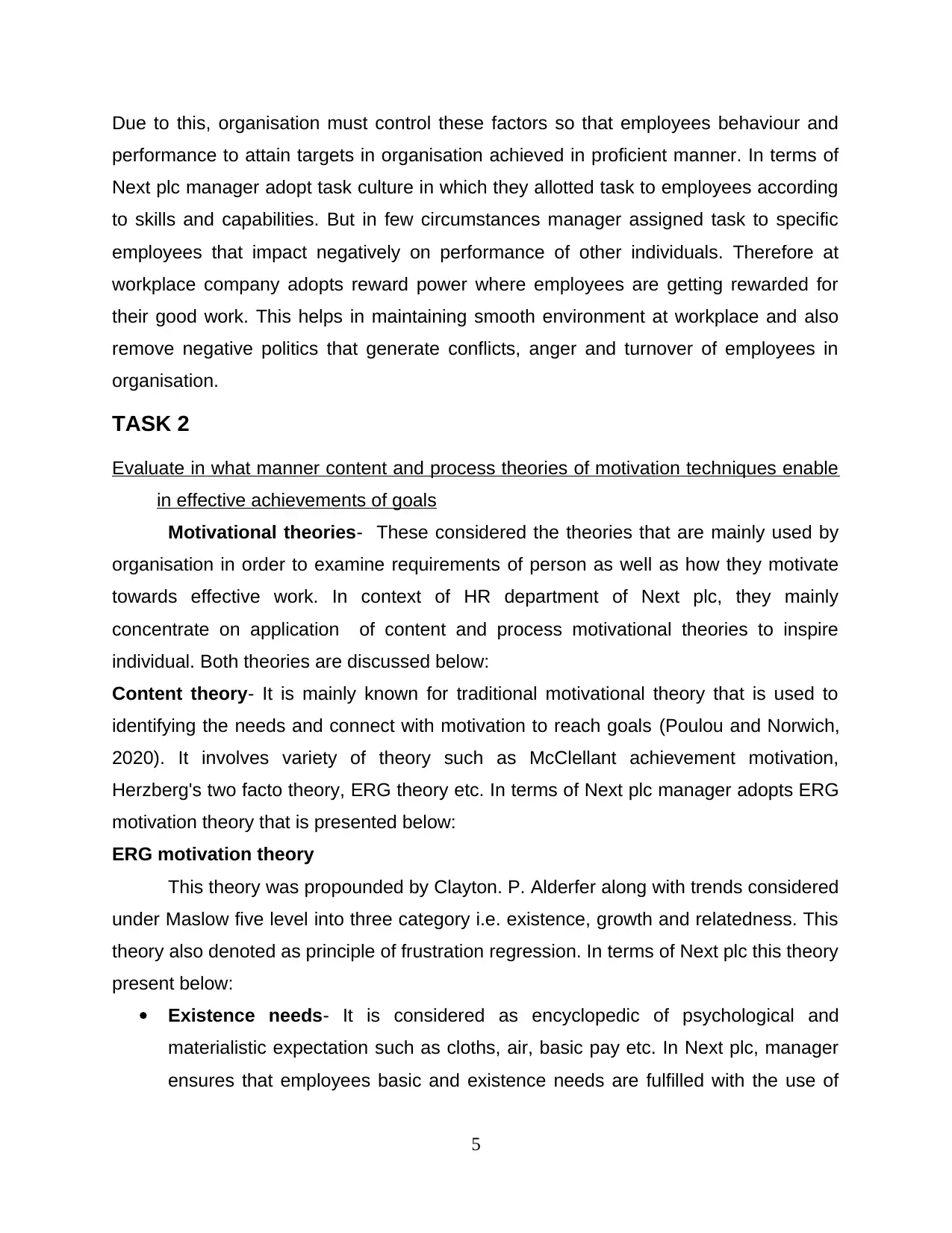
Due to this, organisation must control these factors so that employees behaviour and
performance to attain targets in organisation achieved in proficient manner. In terms of
Next plc manager adopt task culture in which they allotted task to employees according
to skills and capabilities. But in few circumstances manager assigned task to specific
employees that impact negatively on performance of other individuals. Therefore at
workplace company adopts reward power where employees are getting rewarded for
their good work. This helps in maintaining smooth environment at workplace and also
remove negative politics that generate conflicts, anger and turnover of employees in
organisation.
TASK 2
Evaluate in what manner content and process theories of motivation techniques enable
in effective achievements of goals
Motivational theories- These considered the theories that are mainly used by
organisation in order to examine requirements of person as well as how they motivate
towards effective work. In context of HR department of Next plc, they mainly
concentrate on application of content and process motivational theories to inspire
individual. Both theories are discussed below:
Content theory- It is mainly known for traditional motivational theory that is used to
identifying the needs and connect with motivation to reach goals (Poulou and Norwich,
2020). It involves variety of theory such as McClellant achievement motivation,
Herzberg's two facto theory, ERG theory etc. In terms of Next plc manager adopts ERG
motivation theory that is presented below:
ERG motivation theory
This theory was propounded by Clayton. P. Alderfer along with trends considered
under Maslow five level into three category i.e. existence, growth and relatedness. This
theory also denoted as principle of frustration regression. In terms of Next plc this theory
present below:
Existence needs- It is considered as encyclopedic of psychological and
materialistic expectation such as cloths, air, basic pay etc. In Next plc, manager
ensures that employees basic and existence needs are fulfilled with the use of
5
performance to attain targets in organisation achieved in proficient manner. In terms of
Next plc manager adopt task culture in which they allotted task to employees according
to skills and capabilities. But in few circumstances manager assigned task to specific
employees that impact negatively on performance of other individuals. Therefore at
workplace company adopts reward power where employees are getting rewarded for
their good work. This helps in maintaining smooth environment at workplace and also
remove negative politics that generate conflicts, anger and turnover of employees in
organisation.
TASK 2
Evaluate in what manner content and process theories of motivation techniques enable
in effective achievements of goals
Motivational theories- These considered the theories that are mainly used by
organisation in order to examine requirements of person as well as how they motivate
towards effective work. In context of HR department of Next plc, they mainly
concentrate on application of content and process motivational theories to inspire
individual. Both theories are discussed below:
Content theory- It is mainly known for traditional motivational theory that is used to
identifying the needs and connect with motivation to reach goals (Poulou and Norwich,
2020). It involves variety of theory such as McClellant achievement motivation,
Herzberg's two facto theory, ERG theory etc. In terms of Next plc manager adopts ERG
motivation theory that is presented below:
ERG motivation theory
This theory was propounded by Clayton. P. Alderfer along with trends considered
under Maslow five level into three category i.e. existence, growth and relatedness. This
theory also denoted as principle of frustration regression. In terms of Next plc this theory
present below:
Existence needs- It is considered as encyclopedic of psychological and
materialistic expectation such as cloths, air, basic pay etc. In Next plc, manager
ensures that employees basic and existence needs are fulfilled with the use of
5
Paraphrase This Document
Need a fresh take? Get an instant paraphrase of this document with our AI Paraphraser
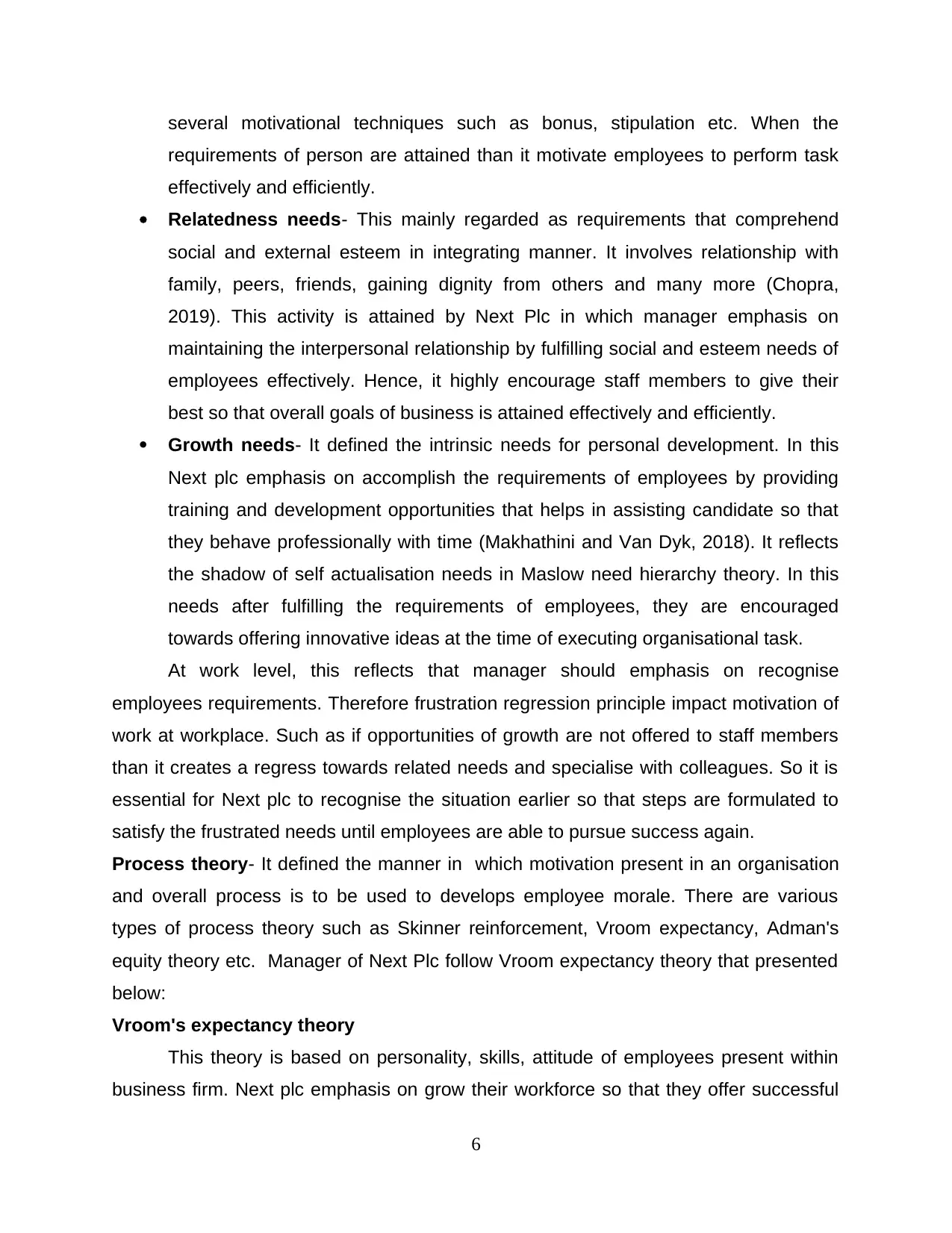
several motivational techniques such as bonus, stipulation etc. When the
requirements of person are attained than it motivate employees to perform task
effectively and efficiently.
Relatedness needs- This mainly regarded as requirements that comprehend
social and external esteem in integrating manner. It involves relationship with
family, peers, friends, gaining dignity from others and many more (Chopra,
2019). This activity is attained by Next Plc in which manager emphasis on
maintaining the interpersonal relationship by fulfilling social and esteem needs of
employees effectively. Hence, it highly encourage staff members to give their
best so that overall goals of business is attained effectively and efficiently.
Growth needs- It defined the intrinsic needs for personal development. In this
Next plc emphasis on accomplish the requirements of employees by providing
training and development opportunities that helps in assisting candidate so that
they behave professionally with time (Makhathini and Van Dyk, 2018). It reflects
the shadow of self actualisation needs in Maslow need hierarchy theory. In this
needs after fulfilling the requirements of employees, they are encouraged
towards offering innovative ideas at the time of executing organisational task.
At work level, this reflects that manager should emphasis on recognise
employees requirements. Therefore frustration regression principle impact motivation of
work at workplace. Such as if opportunities of growth are not offered to staff members
than it creates a regress towards related needs and specialise with colleagues. So it is
essential for Next plc to recognise the situation earlier so that steps are formulated to
satisfy the frustrated needs until employees are able to pursue success again.
Process theory- It defined the manner in which motivation present in an organisation
and overall process is to be used to develops employee morale. There are various
types of process theory such as Skinner reinforcement, Vroom expectancy, Adman's
equity theory etc. Manager of Next Plc follow Vroom expectancy theory that presented
below:
Vroom's expectancy theory
This theory is based on personality, skills, attitude of employees present within
business firm. Next plc emphasis on grow their workforce so that they offer successful
6
requirements of person are attained than it motivate employees to perform task
effectively and efficiently.
Relatedness needs- This mainly regarded as requirements that comprehend
social and external esteem in integrating manner. It involves relationship with
family, peers, friends, gaining dignity from others and many more (Chopra,
2019). This activity is attained by Next Plc in which manager emphasis on
maintaining the interpersonal relationship by fulfilling social and esteem needs of
employees effectively. Hence, it highly encourage staff members to give their
best so that overall goals of business is attained effectively and efficiently.
Growth needs- It defined the intrinsic needs for personal development. In this
Next plc emphasis on accomplish the requirements of employees by providing
training and development opportunities that helps in assisting candidate so that
they behave professionally with time (Makhathini and Van Dyk, 2018). It reflects
the shadow of self actualisation needs in Maslow need hierarchy theory. In this
needs after fulfilling the requirements of employees, they are encouraged
towards offering innovative ideas at the time of executing organisational task.
At work level, this reflects that manager should emphasis on recognise
employees requirements. Therefore frustration regression principle impact motivation of
work at workplace. Such as if opportunities of growth are not offered to staff members
than it creates a regress towards related needs and specialise with colleagues. So it is
essential for Next plc to recognise the situation earlier so that steps are formulated to
satisfy the frustrated needs until employees are able to pursue success again.
Process theory- It defined the manner in which motivation present in an organisation
and overall process is to be used to develops employee morale. There are various
types of process theory such as Skinner reinforcement, Vroom expectancy, Adman's
equity theory etc. Manager of Next Plc follow Vroom expectancy theory that presented
below:
Vroom's expectancy theory
This theory is based on personality, skills, attitude of employees present within
business firm. Next plc emphasis on grow their workforce so that they offer successful
6

results to company. It is important for employees to work in coordination to generate
profitable outcomes into firm. This theory include three aspect in terms of maintain
company success while motivating employees. These three factors are presented
below:
Valance- Motivation is termed as crucial aspect that is used to developed
valance instrument because it support employees to work effectively within team
to develop strategic decision (Patnaik and Shukla, 2021). In terms of Next plc,
manager emphasis on motivate employees towards effective performance in
group so that proper decisions are developed that reflect positive outcomes
within organisation. In this every individual get rewards according to performance
that helps in making strategic decision. Additionally it also helps in plan
anticipated goals to find workforce at workplace. Although it helps in gaining
effective and successful results in firm.
Expectancy- This belief the one effort that result in attain desired performance. It
is based on self-confidence, past experience that present difficulty on goal
attainment (Gray, 2019). In this Next plc observe that their employees are highly
influenced to present expected outcomes for the attainments of business
enterprise objectives.
Instrumentality- The benefits are offered to employees as per position of
personnel that they develop through the performance of work. In this aspect,
Next plc assist manager to offer rewards according to working of employees so
that company attained desired results effectively and efficiently. Rewards are
offers to staff members so that they feel satisfied and work appropriately due to
which company goals are attained in specified period of time.
According to above analysis, It is critical evaluated that Next Plc follow ERG
theory that guide company if employees high level needs are not satisfied then
individual regress the lower level requirements that helps in simply satisfy the workers.
This also effective to distinct the requirements of different person so that every person
needs are fulfilled in proper manner.
7
profitable outcomes into firm. This theory include three aspect in terms of maintain
company success while motivating employees. These three factors are presented
below:
Valance- Motivation is termed as crucial aspect that is used to developed
valance instrument because it support employees to work effectively within team
to develop strategic decision (Patnaik and Shukla, 2021). In terms of Next plc,
manager emphasis on motivate employees towards effective performance in
group so that proper decisions are developed that reflect positive outcomes
within organisation. In this every individual get rewards according to performance
that helps in making strategic decision. Additionally it also helps in plan
anticipated goals to find workforce at workplace. Although it helps in gaining
effective and successful results in firm.
Expectancy- This belief the one effort that result in attain desired performance. It
is based on self-confidence, past experience that present difficulty on goal
attainment (Gray, 2019). In this Next plc observe that their employees are highly
influenced to present expected outcomes for the attainments of business
enterprise objectives.
Instrumentality- The benefits are offered to employees as per position of
personnel that they develop through the performance of work. In this aspect,
Next plc assist manager to offer rewards according to working of employees so
that company attained desired results effectively and efficiently. Rewards are
offers to staff members so that they feel satisfied and work appropriately due to
which company goals are attained in specified period of time.
According to above analysis, It is critical evaluated that Next Plc follow ERG
theory that guide company if employees high level needs are not satisfied then
individual regress the lower level requirements that helps in simply satisfy the workers.
This also effective to distinct the requirements of different person so that every person
needs are fulfilled in proper manner.
7
⊘ This is a preview!⊘
Do you want full access?
Subscribe today to unlock all pages.

Trusted by 1+ million students worldwide
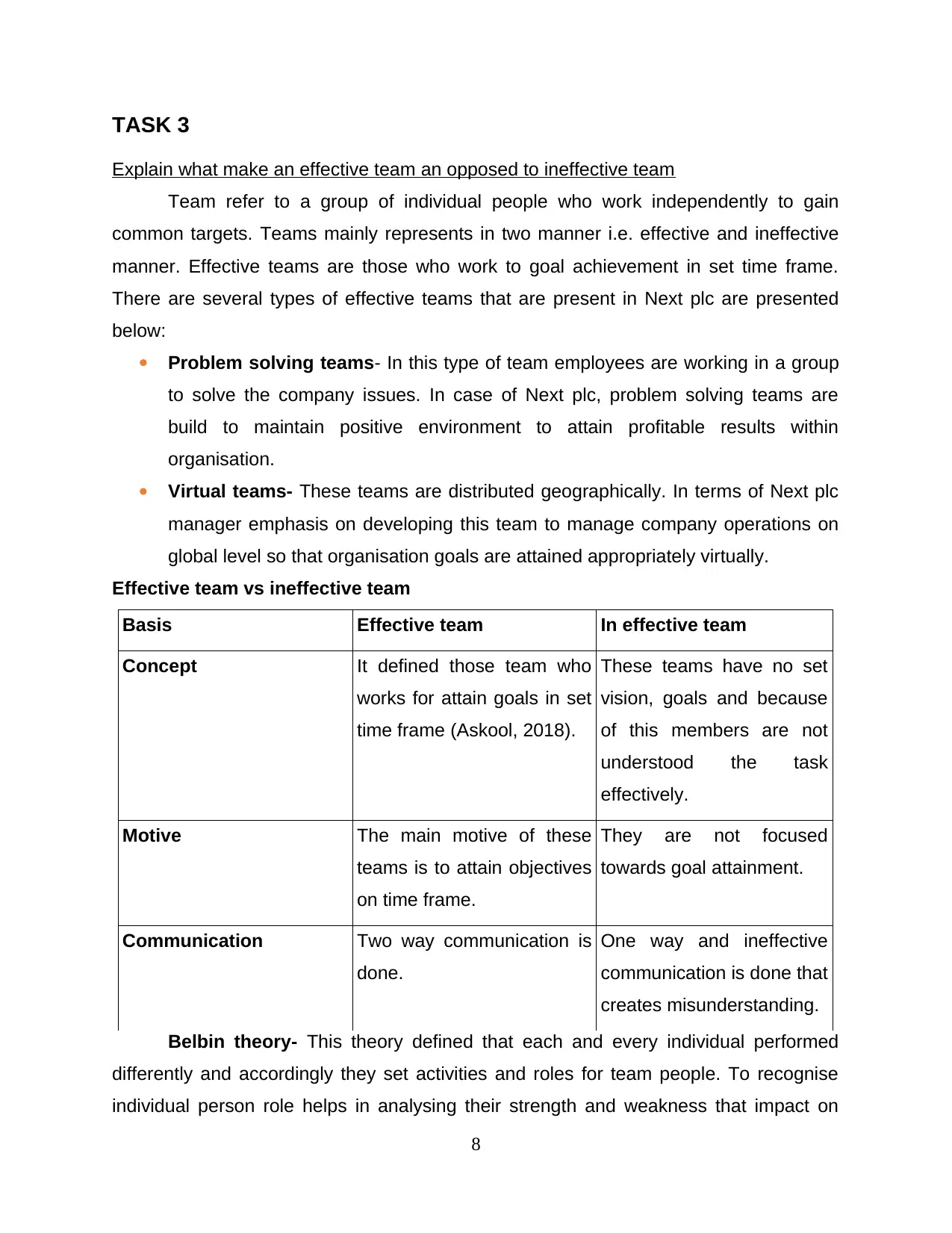
TASK 3
Explain what make an effective team an opposed to ineffective team
Team refer to a group of individual people who work independently to gain
common targets. Teams mainly represents in two manner i.e. effective and ineffective
manner. Effective teams are those who work to goal achievement in set time frame.
There are several types of effective teams that are present in Next plc are presented
below:
Problem solving teams- In this type of team employees are working in a group
to solve the company issues. In case of Next plc, problem solving teams are
build to maintain positive environment to attain profitable results within
organisation.
Virtual teams- These teams are distributed geographically. In terms of Next plc
manager emphasis on developing this team to manage company operations on
global level so that organisation goals are attained appropriately virtually.
Effective team vs ineffective team
Basis Effective team In effective team
Concept It defined those team who
works for attain goals in set
time frame (Askool, 2018).
These teams have no set
vision, goals and because
of this members are not
understood the task
effectively.
Motive The main motive of these
teams is to attain objectives
on time frame.
They are not focused
towards goal attainment.
Communication Two way communication is
done.
One way and ineffective
communication is done that
creates misunderstanding.
Belbin theory- This theory defined that each and every individual performed
differently and accordingly they set activities and roles for team people. To recognise
individual person role helps in analysing their strength and weakness that impact on
8
Explain what make an effective team an opposed to ineffective team
Team refer to a group of individual people who work independently to gain
common targets. Teams mainly represents in two manner i.e. effective and ineffective
manner. Effective teams are those who work to goal achievement in set time frame.
There are several types of effective teams that are present in Next plc are presented
below:
Problem solving teams- In this type of team employees are working in a group
to solve the company issues. In case of Next plc, problem solving teams are
build to maintain positive environment to attain profitable results within
organisation.
Virtual teams- These teams are distributed geographically. In terms of Next plc
manager emphasis on developing this team to manage company operations on
global level so that organisation goals are attained appropriately virtually.
Effective team vs ineffective team
Basis Effective team In effective team
Concept It defined those team who
works for attain goals in set
time frame (Askool, 2018).
These teams have no set
vision, goals and because
of this members are not
understood the task
effectively.
Motive The main motive of these
teams is to attain objectives
on time frame.
They are not focused
towards goal attainment.
Communication Two way communication is
done.
One way and ineffective
communication is done that
creates misunderstanding.
Belbin theory- This theory defined that each and every individual performed
differently and accordingly they set activities and roles for team people. To recognise
individual person role helps in analysing their strength and weakness that impact on
8
Paraphrase This Document
Need a fresh take? Get an instant paraphrase of this document with our AI Paraphraser
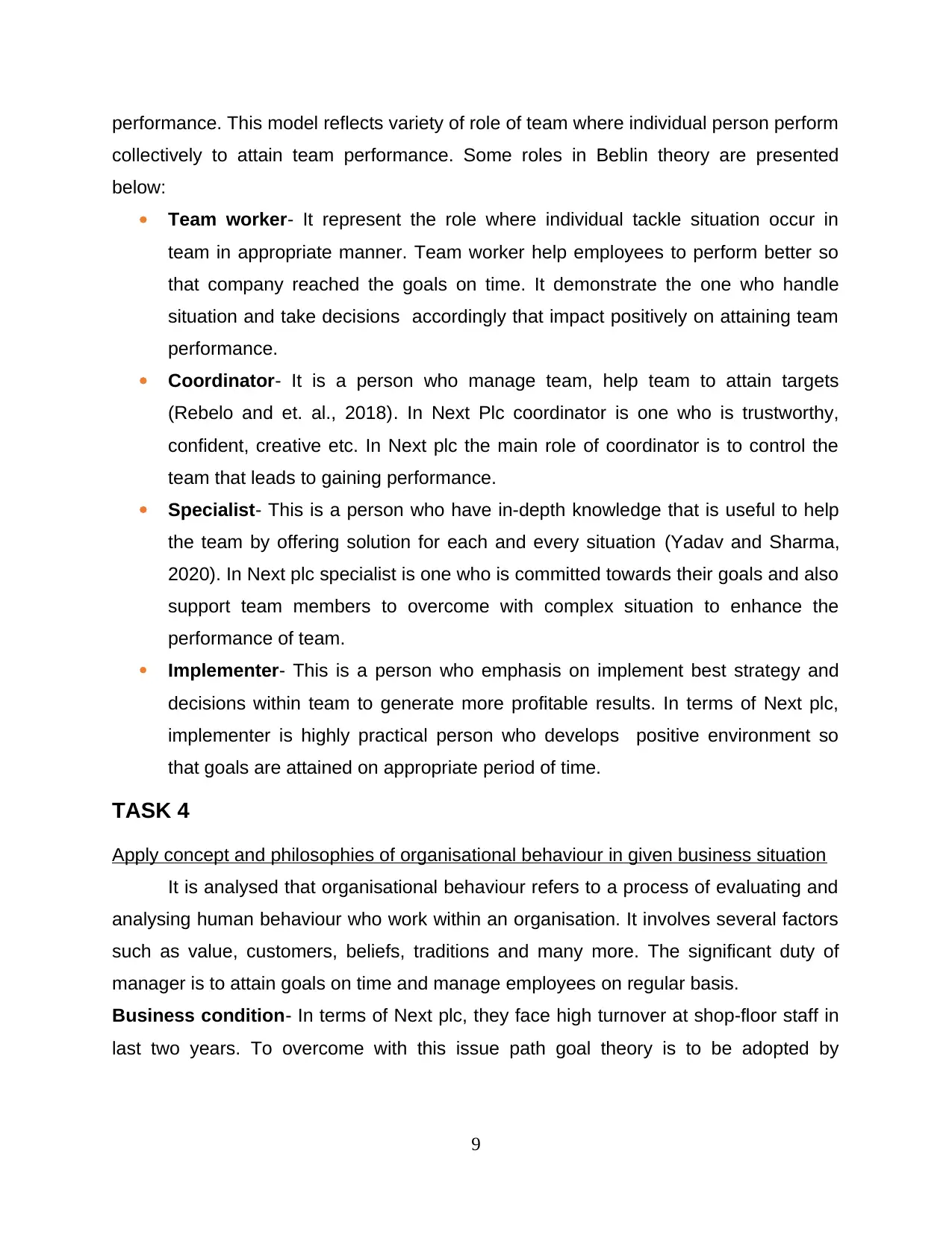
performance. This model reflects variety of role of team where individual person perform
collectively to attain team performance. Some roles in Beblin theory are presented
below:
Team worker- It represent the role where individual tackle situation occur in
team in appropriate manner. Team worker help employees to perform better so
that company reached the goals on time. It demonstrate the one who handle
situation and take decisions accordingly that impact positively on attaining team
performance.
Coordinator- It is a person who manage team, help team to attain targets
(Rebelo and et. al., 2018). In Next Plc coordinator is one who is trustworthy,
confident, creative etc. In Next plc the main role of coordinator is to control the
team that leads to gaining performance.
Specialist- This is a person who have in-depth knowledge that is useful to help
the team by offering solution for each and every situation (Yadav and Sharma,
2020). In Next plc specialist is one who is committed towards their goals and also
support team members to overcome with complex situation to enhance the
performance of team.
Implementer- This is a person who emphasis on implement best strategy and
decisions within team to generate more profitable results. In terms of Next plc,
implementer is highly practical person who develops positive environment so
that goals are attained on appropriate period of time.
TASK 4
Apply concept and philosophies of organisational behaviour in given business situation
It is analysed that organisational behaviour refers to a process of evaluating and
analysing human behaviour who work within an organisation. It involves several factors
such as value, customers, beliefs, traditions and many more. The significant duty of
manager is to attain goals on time and manage employees on regular basis.
Business condition- In terms of Next plc, they face high turnover at shop-floor staff in
last two years. To overcome with this issue path goal theory is to be adopted by
9
collectively to attain team performance. Some roles in Beblin theory are presented
below:
Team worker- It represent the role where individual tackle situation occur in
team in appropriate manner. Team worker help employees to perform better so
that company reached the goals on time. It demonstrate the one who handle
situation and take decisions accordingly that impact positively on attaining team
performance.
Coordinator- It is a person who manage team, help team to attain targets
(Rebelo and et. al., 2018). In Next Plc coordinator is one who is trustworthy,
confident, creative etc. In Next plc the main role of coordinator is to control the
team that leads to gaining performance.
Specialist- This is a person who have in-depth knowledge that is useful to help
the team by offering solution for each and every situation (Yadav and Sharma,
2020). In Next plc specialist is one who is committed towards their goals and also
support team members to overcome with complex situation to enhance the
performance of team.
Implementer- This is a person who emphasis on implement best strategy and
decisions within team to generate more profitable results. In terms of Next plc,
implementer is highly practical person who develops positive environment so
that goals are attained on appropriate period of time.
TASK 4
Apply concept and philosophies of organisational behaviour in given business situation
It is analysed that organisational behaviour refers to a process of evaluating and
analysing human behaviour who work within an organisation. It involves several factors
such as value, customers, beliefs, traditions and many more. The significant duty of
manager is to attain goals on time and manage employees on regular basis.
Business condition- In terms of Next plc, they face high turnover at shop-floor staff in
last two years. To overcome with this issue path goal theory is to be adopted by
9
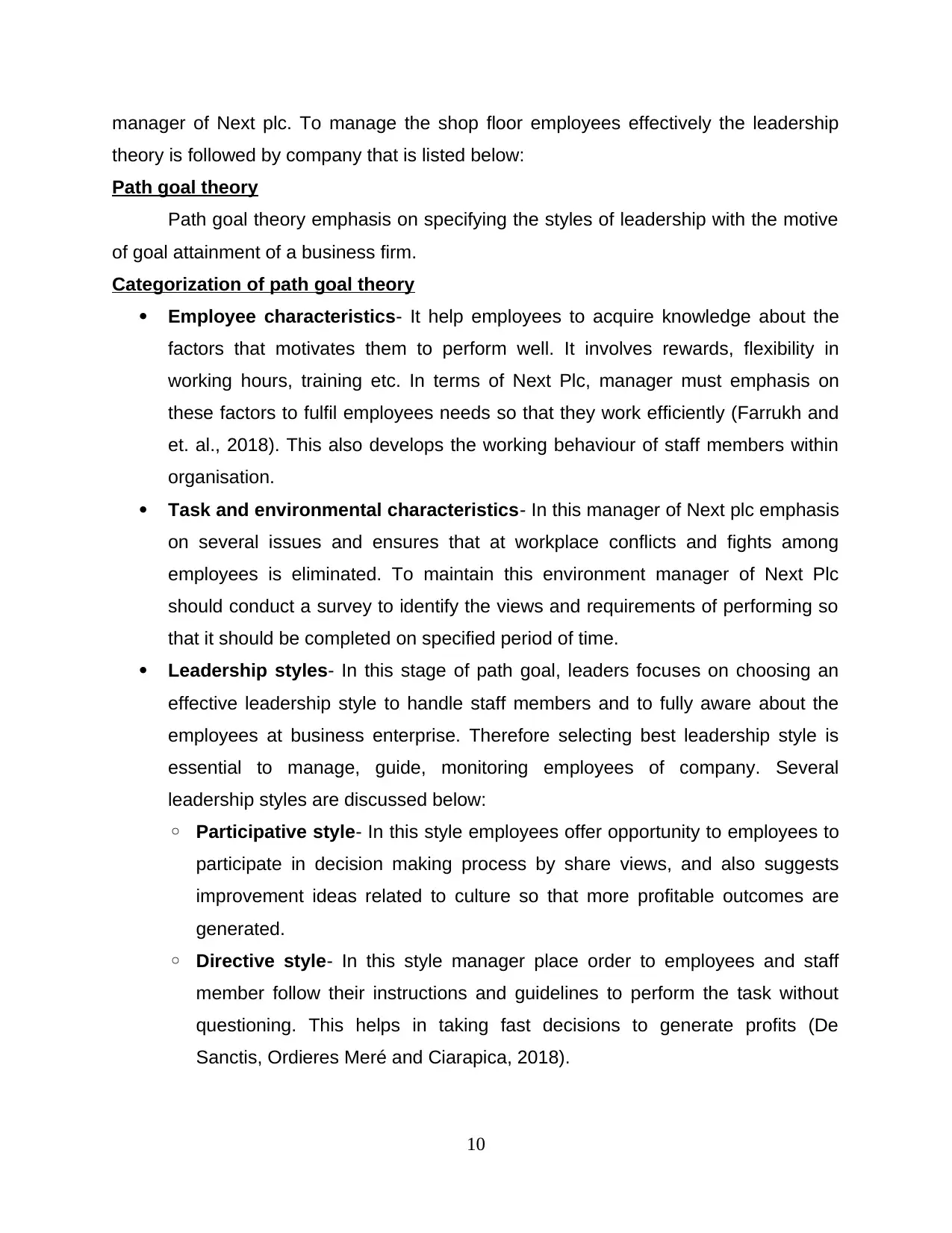
manager of Next plc. To manage the shop floor employees effectively the leadership
theory is followed by company that is listed below:
Path goal theory
Path goal theory emphasis on specifying the styles of leadership with the motive
of goal attainment of a business firm.
Categorization of path goal theory
Employee characteristics- It help employees to acquire knowledge about the
factors that motivates them to perform well. It involves rewards, flexibility in
working hours, training etc. In terms of Next Plc, manager must emphasis on
these factors to fulfil employees needs so that they work efficiently (Farrukh and
et. al., 2018). This also develops the working behaviour of staff members within
organisation.
Task and environmental characteristics- In this manager of Next plc emphasis
on several issues and ensures that at workplace conflicts and fights among
employees is eliminated. To maintain this environment manager of Next Plc
should conduct a survey to identify the views and requirements of performing so
that it should be completed on specified period of time.
Leadership styles- In this stage of path goal, leaders focuses on choosing an
effective leadership style to handle staff members and to fully aware about the
employees at business enterprise. Therefore selecting best leadership style is
essential to manage, guide, monitoring employees of company. Several
leadership styles are discussed below:
◦ Participative style- In this style employees offer opportunity to employees to
participate in decision making process by share views, and also suggests
improvement ideas related to culture so that more profitable outcomes are
generated.
◦ Directive style- In this style manager place order to employees and staff
member follow their instructions and guidelines to perform the task without
questioning. This helps in taking fast decisions to generate profits (De
Sanctis, Ordieres Meré and Ciarapica, 2018).
10
theory is followed by company that is listed below:
Path goal theory
Path goal theory emphasis on specifying the styles of leadership with the motive
of goal attainment of a business firm.
Categorization of path goal theory
Employee characteristics- It help employees to acquire knowledge about the
factors that motivates them to perform well. It involves rewards, flexibility in
working hours, training etc. In terms of Next Plc, manager must emphasis on
these factors to fulfil employees needs so that they work efficiently (Farrukh and
et. al., 2018). This also develops the working behaviour of staff members within
organisation.
Task and environmental characteristics- In this manager of Next plc emphasis
on several issues and ensures that at workplace conflicts and fights among
employees is eliminated. To maintain this environment manager of Next Plc
should conduct a survey to identify the views and requirements of performing so
that it should be completed on specified period of time.
Leadership styles- In this stage of path goal, leaders focuses on choosing an
effective leadership style to handle staff members and to fully aware about the
employees at business enterprise. Therefore selecting best leadership style is
essential to manage, guide, monitoring employees of company. Several
leadership styles are discussed below:
◦ Participative style- In this style employees offer opportunity to employees to
participate in decision making process by share views, and also suggests
improvement ideas related to culture so that more profitable outcomes are
generated.
◦ Directive style- In this style manager place order to employees and staff
member follow their instructions and guidelines to perform the task without
questioning. This helps in taking fast decisions to generate profits (De
Sanctis, Ordieres Meré and Ciarapica, 2018).
10
⊘ This is a preview!⊘
Do you want full access?
Subscribe today to unlock all pages.

Trusted by 1+ million students worldwide
1 out of 15
Related Documents
Your All-in-One AI-Powered Toolkit for Academic Success.
+13062052269
info@desklib.com
Available 24*7 on WhatsApp / Email
![[object Object]](/_next/static/media/star-bottom.7253800d.svg)
Unlock your academic potential
Copyright © 2020–2026 A2Z Services. All Rights Reserved. Developed and managed by ZUCOL.



